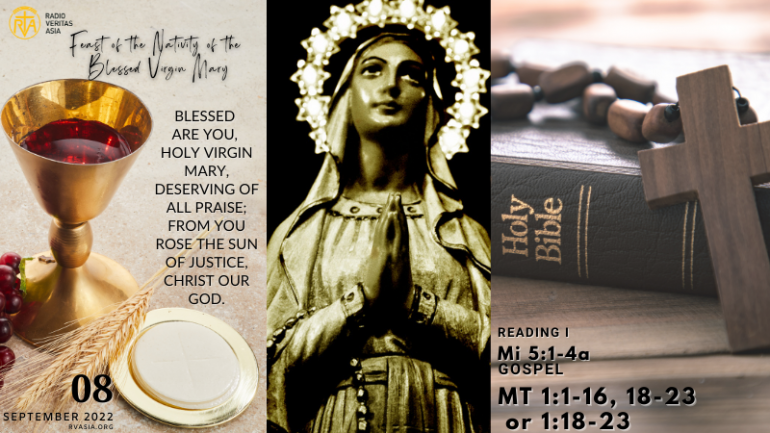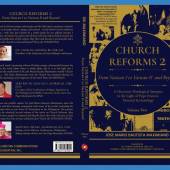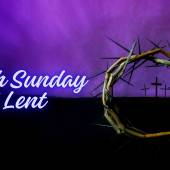On the Night of the 8th September

My visit to a religious article store left me speechless when I saw a rare statue of Maria Bambina laid on the table.
Wow! I was elated, and then there was a flashback of the holy picture we usually use during the novenas. This is the feast most loved by all, with great fervour and devotion. Thousands of pilgrims throng Vailankani, Tamil Nadu, south India, and other Marian shrines all over the world.
We in Goa, western India, celebrate the feast as Monti Fest, a major Catholic festival held on September 8 every year by the Latin Christian community of Konkani people). Every parish celebrates this feast with novenas and a traditional way of showering flowers on the statue with a special hymn “Devache Maie” (Hymn to Mother Mary in Konkani language).
I still remember we sang as children and also had lots of fun, throwing some petals on those in the front. The village of Chinchinim celebrates it as their Patron's Day, while the faithful of Sotrant-Cortalim celebrate it as Our Lady of Vailankani's Day. This year a lot of Goans have traveled to Chennai in Tamil Nadu state of south India to be at the feet of Our Lady of Vailankani to fulfill their vows, as the last two years people were forced to remain indoors due to the pandemic.
In the miracle of the Wedding at Cana, St. John in his gospel focuses on the importance of the request that Mother Mary made to Jesus and of the instructions given by Mother Mary to the waiters. A "request" and an "instruction"! She says to her son, "They have no wine!"! And to the waiters: "Do whatever he tells you". These are just phrases among the many spoken words as we do in our day-to-day life; yet, they are not just mere phrases but words that prefigured Jesus’ ministry and manifested her as an intermediary and intercessor.
Yes, she intercedes for us and is our perpetual succor, but do we, as her children, listen to her only given instruction—do whatever he tells you? If the waiters could listen to her, why not us? Is she interested in the candles we lit for her and all the other daylong or distant pilgrimages? We call ourselves Christians, but are we Christ-like, our behaviour patterns? Christ gave us only one commandment. And if we declare that we love God, the Bible says, "If you love me, you will obey my commandments."
So, it’s high time that we take a deeper look and stop deceiving ourselves by coming to terms with giving up all inordinate ways.
It’s time to respect the girl child, the little Maria Bambina in our homes, our neighborhoods, our villages, and in India.
Without a doubt, we all love our mothers, and on their birthdays we remember and especially honor them.
Four to five decades ago, few people knew their birth dates, and even fewer celebrated them; instead, parents made their children happy by remembering them on their birthdays. Today’s parents have the photos of each year, and every year a photo is added to the gallery. But unfortunately, we don’t have any account of our beloved Blessed Mother Mary in the Gospels. Yet some writings give us a little account of her birth.
The "Protoevangelium of James", which was probably put into its final written form in the early second century, describes Mary's father, Joachim, as a wealthy member of one of the twelve tribes of Israel. He and his wife, Anne, were deeply grieved by their childlessness.
Pious accounts place the birthplace of the Virgin Mary in Sepphoris, Israel, where a 5th-century basilica has been excavated at the site. Some accounts speak of Nazareth, while others say it was in a house near the Sheep Gate in Jerusalem. It is possible that a wealthy man such as Joachim had a home in both Judea and Galilee. However, Charles Souvay, writing in the Catholic Encyclopedia, says that the idea that Joachim possessed large herds and flocks cannot be asserted with certainty, as the sources for this are "...of very doubtful value."
The earliest document commemorating Marymas comes from a hymn written in the sixth century. The feast may have originated somewhere in Syria or Palestine at the beginning of the sixth century, when, after the Council of Ephesus, the cult of the Mother of God was greatly intensified, especially in Syria.
The first liturgical commemoration is connected with the sixth-century dedication of the Basilica Sanctae Mariae ubi nata est, now called the Church of St. Anne in Jerusalem.
The original church, built in the fifth century, was a Marian basilica erected on the spot known as the shepherd's pool and is thought to have been the home of Mary's parents. In the seventh century, the feast was celebrated by the Byzantines as the feast of the Birth of the Blessed Virgin Mary. Because the story of Mary's Nativity is only known from apocryphal sources, the Latin Church was slow to embrace this festival. The feast was introduced to Rome by Eastern monks at the end of the seventh century.
The church of Angers in France claims that St. Maurilius instituted this feast at Angers as a consequence of a revelation about 430. On the night of September 8, a man heard angels singing in heaven, and when he asked why, they told him it was because the Virgin was born that night. However, this tradition is not supported by historical evidence.
As we honour and venerate our mother on her birthday, we pray for protection under her mantle and for the virtues by which she is endowed to be a true disciple and a faithful mother.
Oh Maria Bambina—the little infant Virgin Mary, intercede for us to be delivered from all forces of evil and the tactics of Satan. Intercede for the babies in the wombs of their mothers, crying for protection and deliverance from deformities. Yes, Oh Maria Bambina, pray for the girl child and the mothers, that the mothers and girls/women be cared for and respected by every man, just as St. Joaquim, your father, showed love, respect, and faithfulness. As rapes and murders occur, the once-safe Goa becomes a death trap for girls and women. Not even an infant is safe! Maria Bambina, my little infant. - Molly Fernandes
Radio Veritas Asia (RVA), a media platform of the Catholic Church, aims to share Christ. RVA started in 1969 as a continental Catholic radio station to serve Asian countries in their respective local language, thus earning the tag “the Voice of Asian Christianity.” Responding to the emerging context, RVA embraced media platforms to connect with the global Asian audience via its 21 language websites and various social media platforms.














